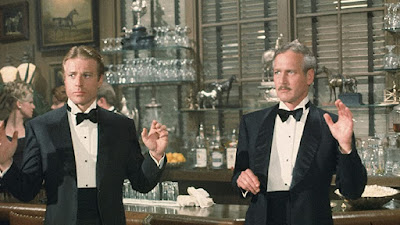On this episode of his podcast Cautionary Tales, Tim Harford gives a gripping account of the literary hoax involving Howard Hughes's alleged autobiography.
Fascinating as the story about Clifford Hughes is, even more interesting are the techniques he used to dupe respected publishers and experienced bankers so that they bought into his deception. That's what a good con trick is all about: storytelling.
I discovered how true that was years ago when Oliver Johnson gave me a book on confidence trickery that his publishing firm had just released. 'I've read it cover to cover,' he said, 'so you won't be able to dupe me.'
Aha, there's a challenge. A few weeks later, in our Tekumel game, Oliver's character had some legal problem and was invited to the Palace of the Realm in Jakalla to meet an official. He entered as a fellow in fine robes was descending from the uppermost tier of one of the bureaucratic pyramids. 'Let's go to lunch,' suggested the official. They agreed a fee for making the legal problem go away. A few days later, when Oliver returned to the Palace of the Realm to check that everything was going smoothly, he met the real official of that name. The other man had simply put on some expensive robes, waited around the upper tiers until Oliver's character arrived, then walked down to introduce himself, collected a fat bribe, and disappeared.
'I can't believe I fell for it!' said Oliver after the game. He even went on to name the con trick I'd used.
I'm sure that it can be very unpleasant to be on the receiving end of a real-life con, but we have a sympathy for con men in stories that we don't have for murderers and drug dealers. Perhaps part of it is the sense that the con man (or woman) has to believe in their own story, at least a little. They need to be part dreamer.
I had a first-hand taste of something like this last year, when I was catfished into agreeing to go to a games meeting that didn't happen. A guy had got in touch about roleplaying; he spent months emailing me about comic books, SF, games and other mutual interests, and then proposed collaborating on a concept for a major gaming franchise. I was dubious because I know that major franchises don't buy in story concepts, but my guy claimed he'd booked a meeting with the senior execs at a famous videogames company and I thought it couldn't hurt to go along. Also, the story concept he had come up with was brilliantly original. Even if I didn't get hired to work on it, I'd want to play the game. 'I'll send a car for you,' he said. Figuring that the car was maybe 50% likely to show up, I put on a clean shirt that day but didn't make any special plans.
You guessed it. Of course the car didn't turn up, there was no meeting with any game execs, and I never heard from the fellow again. This was the (slightly) surprising but (very) inevitable ending I'd half expected; the only disappointment was that the payoff had to be so low-key. I would never get to meet the guy who set up the con, nor even know his real name, so there was no big reveal, no dramatic denouement. I couldn't even shake his hand and say, as Oliver did to me after that Tekumel game, 'Ya got me!'
On the other hand, that's part of the beauty of it. In all such stories, it's the victim of the con who must supply their own epiphany.
'The end of all our exploring will be to arrive where we started and know the place for the first time.'
That's how I run my roleplaying games too, after all. I'm not telling a story, I'm just setting things up so the players can find their own story.
So I had a Zen kind of lesson and it cost me nothing. Plus I got to hear the pitch for a genuinely interesting story. (I won't say anything about it here in case my catfisher actually uses it in some form for a comic or novel or something.) That's probably as benevolent as con tricks get in real life, and it reminded me what effective story elements they make. If you're stuck for an idea for your next game, take a look at some of these and have some fun with them.




Perhaps something befell the fellow just before the planned event. Unless of course he never revealed his identity during the course of the communication, in which case, probably a fabrication as you assume.
ReplyDeleteHopefully there's not a group of senior execs somewhere who are miffed at being stood up by some uppity gamebook author... :)
Of course you probably subsequently reached out to the company in question to confirm it was all indeed an elaborate ploy.
It was slightly overwrought as a scam, since he claimed we'd be pitching direct to the European CEO at an unknown location somewhere near Guildford. All very cloak-&-dagger and not how the big games publishers operate, but within the unreal context of a con it made sense.
Delete